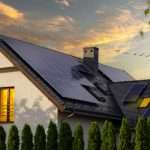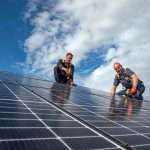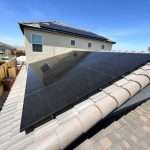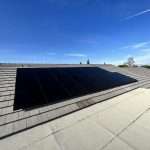Solar rooftop panels and home batteries have become increasingly popular in recent years as the solar energy technology advanced and became more affordable. Solar home solutions have now become more cost-effective, easier to install, more flexible, and more efficient than they’ve ever been. There are many reasons why you might want to consider solar for your home, including reducing your carbon footprint and saving money on your energy bill.
Are you looking to find more and learn more about solar energy and the benefits it can bring upon your home? If you’re interested in learning more about solar energy and what it can do for your home, read on for a comprehensive guide to solar power. We’ll cover the basics of how solar works, the different types of solar panels available, and the benefits of going solar.
What is Solar Energy?
Solar energy is simply the light and heat that comes from the sun. Solar technologies can be used to generate electricity, provide hot water, or even power entire buildings. Solar energy is a clean, renewable resource that can help to reduce our reliance on fossil fuels.
The panels are made up of a layer of silicon cells, a metal frame, a glass casing surrounded by a special film, and wiring, and each one is divided into four parts. The panels are arranged in “arrays” (an ordered series) and placed on rooftops or in large outdoor areas for maximum impact. The solar cells, also known as photovoltaic cells (PV), absorb sunlight throughout the day. When sunlight hits the PV cells, it creates an electrical field in the cells. This electrical field causes electrons to flow, creating an electric current. The current is then sent to an inverter, which converts it from direct current (DC) to alternating current (AC), which is the type of electricity used in homes and businesses.
Related article: Understanding How Solar Panels Work

The Benefits of Solar Energy
There are many benefits to using solar energy, both for the environment and for your wallet.
- Solar energy is constantly regenerative and limitless in supply. The quantity of solar energy available is enormous, approximately 10,000 times that required by humans now, and it’s continuously renewed. A tiny 0.02% portion of incoming sunlight if captured correctly would be enough to completely replace all other fuel sources presently in use.
- Solar power is a clean, renewable energy source. Solar panels don’t produce any emissions or pollutants, making them a much cleaner option than fossil fuels such as coal and natural gas. Although they do have environmental costs throughout production and construction, when compared to the damage caused by traditional energy sources, these environmental impacts are insignificant: fossil fuels emit roughly 21.3 billion metric tons of carbon dioxide each year as a result of burning. Burning fossil fuels releases harmful greenhouse gases into the atmosphere, which contributes to climate change. Solar power doesn’t release any emissions, making it a much cleaner and more sustainable option.
- Solar energy is an excellent choice for inaccessible regions that aren’t linked to a power grid. Solar panels can be set up in remote locations, z `providing power to homes or businesses that would otherwise have no access to electricity. Solar energy may offer significant benefits for millions of people around the world, especially in Sub-Saharan Africa, where as many as 90% of rural residents lack access to electricity. People who live in these regions must use fuel-based lighting, which has significant social and environmental costs, such as jeopardized health, indoor air pollution, and reduced productivity.
- Solar panels are also relatively low maintenance. Once they’re installed, they can last for decades with little to no upkeep. And, as technology continues to improve, solar panels are becoming more and more efficient at converting sunlight into electricity.
- Solar energy may provide government tax credits. The federal government provides tax credit incentives of up to 30% of system expenses. California, which has plenty of sunshine and high power prices as well as an overburdened grid, was the first state to offer strong renewable-energy subsidies for homes and businesses.

- Solar energy is also good for the economy. Solar panel installation creates jobs in the construction and solar industries, and it also reduces our dependence on foreign energy sources. In 2018, E2 reported that jobs in renewable energy are growing at the quickest pace in 12 states. Renewable energy is already the fastest-growing source of new US electricity generation, according to the US Bureau of Labor Statistics, with solar installer (105 percent growth) and wind technicians (96 percent growth) among the anticipated two fastest-growing occupations through 2026.
- Solar power reduces foreign energy expenditures. In many nations, a significant portion of income is devoted to the purchase of imported oil for electricity production. The United States spends $13 million per hour on oil, with much of it coming from Persian Gulf countries. The global recession and the resulting oil shortages, coupled with the political instability in this volatile region, are helping to fuel the expansion of solar energy and other alternative energy technologies.
- Solar energy can also increase the value of your home. A study by the Lawrence Berkeley National Laboratory found that homes with rooftop solar panels sell for an average of 4.1% more than non-solar homes. Moreover, the increase in value was found to be even higher in states with high electricity prices, such as California and New York. This increase in value is due to the fact that solar panels provide significant savings on monthly electricity bills, making them an appealing feature for potential homebuyers. In addition, solar panels can help to protect against future increases in energy costs, further adding to their appeal. As a result, installing solar panels can be a wise investment that not only benefits the environment but also increase the value of your home.
- Solar power is consistent and dependable. Many people choose solar energy because it is resistant to utility company breakdowns, particularly those caused by political or economic upheaval, terrorism, natural disasters, or brownouts as a result of overuse. Rolling blackouts are a regular occurrence in some South Asian nations and occur from time to time in California and Texas. In 2003, the Northeast Blackout disrupted 55 million people across two countries.
- Solar energy can save you money. Solar panels can provide significant savings on your energy bill, as they reduce or eliminate your reliance on the grid. Solar panels offset the cost of traditional electricity, and in some cases, they can even generate extra income through solar rebates and solar credits.
If you’re considering using solar energy in your home or business, there are a few things to keep in mind. Solar panels need to be installed in an area that receives direct sunlight for the majority of the day. They can be mounted on roofs or placed on the ground. You’ll also need to factor in the cost of installation, which can vary depending on the size and type of solar panel system you choose.
Do Solar Panels Need Direct Sunlight to Work?

Solar panels may not receive adequate sunlight for a variety of reasons. They may be hidden from view by buildings or trees, angled away from the sun, or otherwise affected by weather conditions like clouds, rain, or snow. Solar panels and their placement will minimize energy output falls owing to weather or shading.
Despite popular belief, you can still get electricity from solar panels even if they don’t receive direct sunlight. Although shade reduces the performance of solar panels, you can still benefit from home solar energy if your roof gets some sunlight during the day.
Solar panels perform best in direct sunlight, but they can also work in partial shade and on cloudy days. This is due to the fact that PV cells convert light particles, called photons, into electricity. Since photons are present in direct and indirect sunlight, solar panels can function in both conditions. However, there will be a decrease in performance when there is no direct sunlight. Because solar panels need 1000 W/m2 of sunlight to reach their maximum output, they will perform less in the shade.
If you want to install solar panels on your home, the first step is to figure out how much shade there will be on your roof. If you think there will be little or no shade, consider installing solar panels that use half-cut solar cells and are linked to MLPEs for reduced output losses. If your roof is completely shaded, you may want to consider whether it’s a good idea to put solar panels in that area.
While you can always put a solar panel on your roof to save money, there’s more to the game than that. A professional solar installer may evaluate how much shade a certain roof section will receive over the year and help you compute solar panel output and payback time based on that.
What Are My Options For Back-Up Power?
Net metering is one of the most significant reasons why solar panel systems at home are such a good investment. The electricity you produce more than your usage, which is fed back into the grid, is compensated by your utility provider through credits on your power bill. When you want to utilize the grid for power, such as at night when your panels aren’t generating electricity, you use credits rather than paying out of pocket for the energy you consume. It means that your home is still a link to the grid, which ensures that you have power during daily or annual changes in solar panel production levels.
Some people and businesses may choose to store the extra energy their systems create rather than sending it back to the grid with a solar storage option, such as the Tesla Powerwall, which can hold excess power instead of returning it to the grid. This is an excellent alternative for people who want to generate the majority of their power on their own and not rely on the utility.
The Bottom Line
Solar energy is a clean, renewable source of electricity that has many benefits for homeowners and businesses. Solar panels are becoming increasingly affordable, and they offer a great return on investment. With proper maintenance, solar panels can last for decades, providing you with years of free electricity. Solar panels are a great way to reduce your carbon footprint and save money on your electric bill. If you’re considering solar energy for your home or business, be sure to take advantage of the many rebates and incentives that are available. Solar energy is an investment that will pay for itself many times over.
Affordable, Clean Energy from Arc Energy Solutions.
Most of us know that we need to protect the environment and reduce greenhouse gases to fight climate change. Helping to preserve our environment can be a tough battle, so it’s natural that we would want to take advantage of all possible resources. That’s why we’ve been focusing our efforts towards providing a clean, affordable form of energy in the Bakersfield, CA. Arc Energy Solutions. is committed to helping do our part in the fight against climate change. We offer a variety of solar PV systems that can meet your energy needs and save you money on your electricity bill. Whether you’re looking for a small system to offset a portion of your home’s electricity usage or a large commercial system to power your business, we can help you find the right solution. We offer a free consultation to help you determine the best solar PV system for your needs and budget.
Arc Energy installs the industry’s best solar panels and equipment, and each system we construct is tailored to achieve maximum performance. If you have any questions about solar energy or need help choosing the right solar panel system for your home or business, please don’t hesitate to contact our team of experts.










